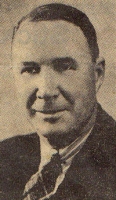
Year Born: 1892
Year Died: 1945
Pioneer
Schultz, Wilford “Bill” (1892-1945)
The Great Depression began with the market crash on October 29, 1929 and lasted for ten years until the Second World War. Of Canada’s nine provinces, Saskatchewan suffered the greatest hardships, not just due to the world-wide economic collapse, but also because of the hail, drought, and grasshopper plagues that destroyed millions of acres of wheat and turned the grain belt into a dustbowl. By 1937, two-thirds of the farm population of Saskatchewan was destitute.
The role played by radio during the depression has never been documented. For most people, especially those living on farms and in other remote areas, the eight radio stations in Saskatchewan provided 18 hours-a-day their only affordable source of entertainment, news and information. Two of these stations had been established by James Richardson and Sons Limited to provide their elevators and the farmers with changing grain prices. One of these stations was CJRM Moose Jaw.
In 1928, CJRM gave 36-year-old Bill Schultz a period of time on Sunday afternoons to host a musical program appropriate for the Sabbath. Like everyone else who got into radio in those days, Bill had no previous experience before a microphone, and while his voice might be more gruff than velvety, it was friendly, and he did own a unique collection of gramophone records that was larger than that of the station.
Born in Godfrey, Ontario in 1892, Bill had come with his parents and siblings to the Estevan area of Saskatchewan when he was 14, and in due course. established a homestead and taught school. It was after moving to Moose Jaw in 1923 that he began to take an interest in radio. Stations in the 20s operated only a few hours a day and likely had only one paid employee. Commercials had yet to be allowed by the Government. Network programming was still ten years off and for entertainment the stations were almost totally dependent on gramophone records. Bill named his program “Golden Memories”, and its theme was a 1922 song composed by Irving Berlin titled “At Peace with the World” played on a Victor record by Jesse Crawford on a theatre pipe organ.
Bill Schultz had yet to chalk-up his one-hundredth program when the Depression hit in 1929. Thereafter, his entire career in broadcasting was spent during the depression and the ensuing years of the Second World War. In those 17 years Bill became the best-loved radio broadcaster in Saskatchewan. He did it by just being himself – a benevolent human being with a friendly nature and a big heart. He had a good sense of humor, but never turned to comedy and theatrics. He identified with the man on the street. Because he had been one of them, he shared an affinity with the people out there on the farms, whose livelihood and whose very life was now threatened by indefensible forces – people searching for a solution, searching for comfort, for consolation, for inspiration, for encouragement, for help. On the airwaves in Saskatchewan, they found it in Bill Shultz.
Bill knew what people needed and wanted – songs that comforted folks who were ill, depressed or in distress – words and music that would help them through another day.
Other Saskatchewan broadcasters answered other needs. Insofar as dance and popular music were concerned, Bill left it to them. However, he opened his program to talented singers and musicians, and many a prairie boy and girl were given a chance to perform on the radio for the first time and to possibly gain recognition for the talent they possessed. Some like Alberta Slim thus found a foothold to success.
In 1935, Bill found a sponsor – the Army and Navy Department Stores – and his Golden Memories program on Sundays moved to CKCK Regina., starting at 12.15 and running to 2.45 pm. The sponsor then added a half-hour daily program on CKCK at 9.00 am which Bill titled “Pleasant Memories” .
While Bill did not broadcast before an audience, visitors to the city sometimes sought him out. On Saturdays, he often could be found mingling with customers at the Army and Navy store.
During the war years, Bill was instrumental in raising funds for the war relief and other appeals, including the Russian War Relief Fund.
In 1941, Bill’s programs on CKCK came to an end and he returned to Moose Jaw, where CHAB began to carry “Golden Memories” on Sunday afternoon.
On Sunday, February 25, 1945, at his home, after preparing his 848th continuous broadcast of “Golden Memories” that afternoon, Bill Schultz died suddenly of a heart attack. At that time, Golden Memories was considered Canada’s oldest continuous radio program.
In his lifetime, Bill Schultz lived by his creed which he recited every day over his opening theme –
“I expect to pass through this world but once;
any good therefore that I can do to any fellow creature,
or kindness I can show, let me do it now; let me not
defer or neglect it, for I shall not pass this way again”
Written by J. Lyman Potts – May, 2007
